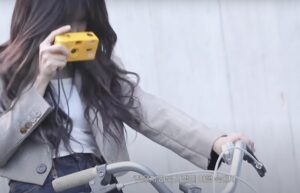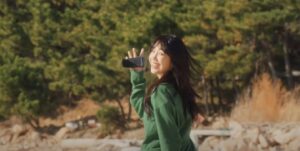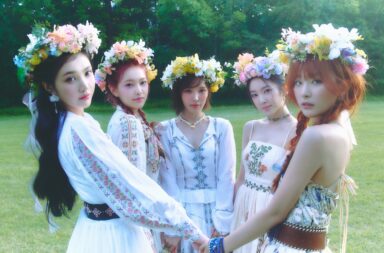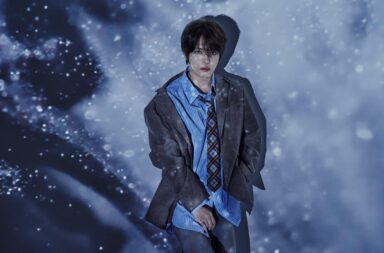
Which songs would you choose to represent the landmark moments of your life? Jeong Eunji has lived her way into the answer with the aptly-named album Log, a narrative of her life told through songs that have shaped her. Log also happens to be the culmination of a long-ago promise she made to Apink fans: to tell her story through the prism of a remake album.
Remakes often garner less fanfare than new music, but oddly enough, they can sometimes offer greater windows into who artists are than original material. Perhaps it’s because singers may feel emboldened to explore uncharted territory with the cushion of material already loved by the public. Another fun side-effect of these projects is that they introduce many fans to hidden treasures: covers of older songs that are well-known in Korea, but may fly under the radar for international listeners.
Log is imbued with the bright, compassionate spirit that makes Eunji so compelling as a storyteller, but it also reveals her anxieties and the hopes she has for her musical legacy. Now, on the precipice of turning thirty (a number that, for better or worse, seems to to be considered a turning point in K-pop), she’s sharing the lessons she’s learned over the course of a decade in the spotlight, and in the process, reveals new colors of her voice in more ways than one.
The album opener, “Journey for Myself,” is a rollicking life anthem that also happens to be extremely profound. Originally performed by Korean rock group Buzz, the song is so jaunty it seems hard to believe it’s framed around a breakup in the first place!
Years before self-love discourse was as ubiquitous as it is now, “Journey for Myself” directly called for “loving [one]self more” and “walking in clouds to the wings” of one’s new dream. The overarching theme of the lyrics is leaving the past behind to embrace a happier, more authentic life, even if it means relinquishing “old, squeaky dreams” we’ve discovered were perhaps not ours to begin with.

Eunji shared that when she was younger, the song’s appeal was its tirelessly optimistic spirit, but as she’s matured the lyrics have stood out to her in fresh ways. Her favorite line is in the first verse, “I’m going to have better memories than love,” because it acknowledges past hurts without being constrained by them.
That determination to make lemonade out of lemons is what resonated with her and has propelled her forward during darker moments. “I didn’t know that when I was a kid, but [that’s] why this song is still so great even after all these years,” she says.
It must be said, though, that what makes “Journey for Myself” pack such a potent musical punch is the canvas it provides for her vocal pyrotechnics. It’s common knowledge that Eunji is one of the most skilled singers in K-pop, and to see her live performance of this song is to witness a performer at the pinnacle of her powers–delivering growls and gritty high notes with an ease and confidence that few others could match.
Her rich, warm tone translates effortlessly to rock and roll, especially considering the genre is formerly uncharted territory for her. The production, too, was slightly altered to convey more of a “fall and winter” feeling, with less of an emphasis on the crunchy guitar and simmering bass of the original.
But the vocal performance that perhaps most steals the show on Log, in terms of breadth of emotion, is “Blue Whale.” What has always stood out about Eunji is the joy and aliveness she exudes while singing. The song that she credits with giving her direction on how to sing is “Blue Whale.” Marked with lyrical peaks and valleys that showcase her mastery of vocal dynamics (and some soaring belts that seem to truly take flight), “Blue Whale” narrates an internal journey from fear to the hope of “living in this big world without [it].”
The song consists entirely of those two verses, so the challenge for Eunji was to make the repeated verses impactful and convey the emotions of the song–at turns weary or hopeful–in a powerful way. The ebbs and flows of “Blue Whale,” and Eunji’s gift for singing with emotion makes for a truly moving listen. The wisdom of the song is that we’re not alone–a sentiment that comforted Eunji and now ripples outward to all of us.

Eunji said that the process of recording Log and basking in these feelings felt like “a load lifted off [her] chest,” respite from a schedule that she often feels is “is chasing [her].” As she put it, the magic of this process is the way her musical narrative will now directly intertwine with others. “I’m singing the exact songs that have consoled me, in my own voice, which in turn will console others,” she says.
The apex of the album is the track “About Thirty,” originally performed by Kim Kwang-Seok. Eunji’s promise to Apink fans was to cover “About Thirty” in an album before her thirtieth birthday, and the significance of fulfilling this promise is not lost on her. “I would listen to this song in my early twenties after debut…The lyrics bear so much meaning, and they seem very personal. It made me reminisce on my own life, that I too have been through a lot.”
She shared that in her twenties, the idea of turning thirty seemed like an impossibility. “About Thirty” represented a future that seemed mysterious, but it also made Eunji deeply reflective, and reminded her of her friends and family–in other words, the people she cherishes most.

Instead of the hopefulness that characterizes Log‘s previous tracks, “About Thirty” is an examination of our mortality, fueled by concern about how to make the most of our time here in the face of loss. “Memory slips away, another day slips away,” Eunji sings. “My youth slips away…I thought it would stay with me longer.”
There’s nothing like the peculiarly human experience of feeling the fleetingness of a moment while you’re living it, a kind of dual consciousness that can feel isolating. Though “About Thirty” contains no answers to the existential angst the song marinates in, the catharsis of it is relatable for just about everyone, and in its own way it is a balm to the heart in acknowledging these are questions we all face.
By Eunji’s own admission, music dominates her thoughts, and that utter love of song has always been a part of her story. She shared that when she’s in the midst of a tough time, “listening to songs have always been [her] way of running from bad thoughts” or periods of uncertainty. “For Love” and “Dream” are the two songs that have contained the seeds of her passion for singing.

“For Love,” chosen in honor of her mother, is an ode to a love that transcends all space and time, capable of withstanding any loss. In her previous solo album Eunji had a track in honor of her dad, so she felt the inclusion of “For Love”–a song she practiced dutifully on the piano for her mother–would be her way of honoring where her love of music began. Deeply emotional, “For Love” is up there with “Blue Whale” in terms of songs that are highly likely to dissolve you into tears. “My mom was surprised that I even [remembered] this song,” Eunji shared. “She really loved it—she cried.”
The close of the album, “Dream,” is Eunji’s personal hype song, and a highly unconventional one at that! It’s the track that gave her the strength to keep moving towards her dream during her early days of training and debut, but is steeped in ambiguity, like “About Thirty.”
“Dream” describes the feeling of loneliness Eunji felt when she moved from her hometown of Busan to Seoul in pursuit of music. And yet there is something life-affirming about the song, in its resolution to persist and look towards the future while savoring “the scent of home.” In “Dream,” the big city, normally characterized as a place of possibility, is “cold and dangerous,” forcing Eunji to sing through her “hot tears.” And yet she stays the course, “singing sad songs” to move through her pain. In “Dream,” singing is the key to salvation, and in this way the track is a window into Eunji’s own self.

Log is timeless, made for repeated listens at graduations, weddings, and the crucial everyday moments when we need a master vocalist like Eunji to give a voice to our deepest thoughts and hopes. The word “healing” is used to describe projects that uplift and soothe the spirit, and this is a perfect characterization of “Log.”
Eunji’s renditions of these songs are so timeless–at turns joyful, wistful, and profound–that it’s hard not to be moved by the depth of emotion she brings to each track.
There’s a saying that at some point we find we’ve lived our way through our questions to the answers. Eunji’s Log shimmers with a wisdom beyond her years, but also is marked by a sense of wonder at all there is left to explore. You could say that she is living her questions and answers at once, and in the process, she cracks open a space of possibility for us to live with greater richness too.
Youtube. Korea Joongang Daily. Images courtesy of IST Entertainment. Lyrics via DailyKpop.net.


